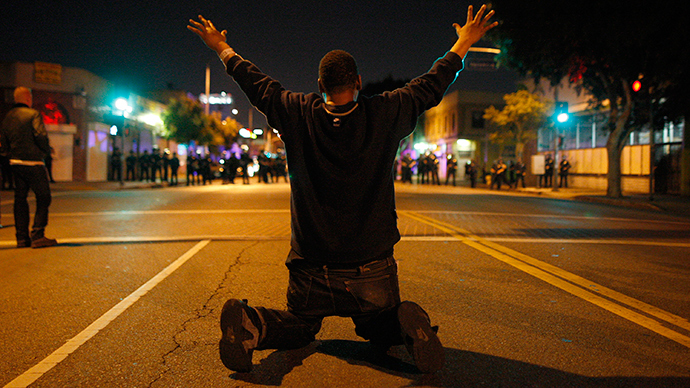‘Racial animosity in US not over’

With the US having a black president many thought the big racial divide was over, but that is not the case as many underlying issues are still bubbling under the surface, Josh Pasek from the University of Michigan told RT.
READ MORE: Ferguson reacts to grand jury decision LIVE UPDATES
RT:What is it about this particular case that has caused so much public anger?
Josh Pasek: I think this is really a case where you have seen something come to the fore where a lot of people were having some real experiences with different interactions with the police and such overtime, and an event really happened that catalyzed that experience and made people say something, and take it into their own hands to say: “We need to act up!” That is really what happened in Ferguson that made it such a national and I guess international issue.
RT:A nationwide survey in September found that 91 percent of blacks said Wilson should be charged, while only 42 percent of whites believed that. Why is this difference so great?
JP: I think the difference is great because when people look at the incident their views are colored by their own experience. That is the underlying story here. If you are black in America right now, the experience that you live in, in terms of your interactions with the police. I don’t think it is because of anything that is done on a purposeful level, or anybody is doing it because they are trying to be malicious. But that little tiny incident built up into a sense that the police in your area might not be as trustworthy as the kind of generally positive experience that most white Americans have with the police. In that context you can end up with the sense that there really is somebody out to get you even if there isn’t.
RT:Do you think the criminal justice system treats different races equally?
JP: I think we see in practice that it doesn't. I think a lot of this isn't on purpose. If you look at the way the criminal justice ends up happening, you end up having typically a jury of people that are designated to go and make a decision around what should happen in a particular case. That jury of people can look at the particular incidents and may find certain pieces of evidence more or less credible. That is really where if anything the racial injustice ends up sometimes happening in the US.
RT:There have been multiple shootings of innocent black civilians by police in recent months. Is this a tragic coincidence, a trend, or is it just something that we are now noticing?
JP: It is something we are noticing more now. A lot of what we are seeing here is that in the environment where we now are, having a black president of the US a lot of people had this sense that big stark divide that the racial animosity in America was over. And that is not the case. The fact is that a lot of the underlying issues that were there are still bubbling under the hood and being able to deal with them, being able to deal with people’s perceptual issues, and the extent to which people have both expressed and probably more frequent implicit biases can end up really shaping the way that we interpret events that happen, the way that we interact with one another and the way that history takes its course. In an environment where you don’t expect that to happen when it does happen it is particularly stark.
The statements, views and opinions expressed in this column are solely those of the author and do not necessarily represent those of RT.
The statements, views and opinions expressed in this column are solely those of the author and do not necessarily represent those of RT.











